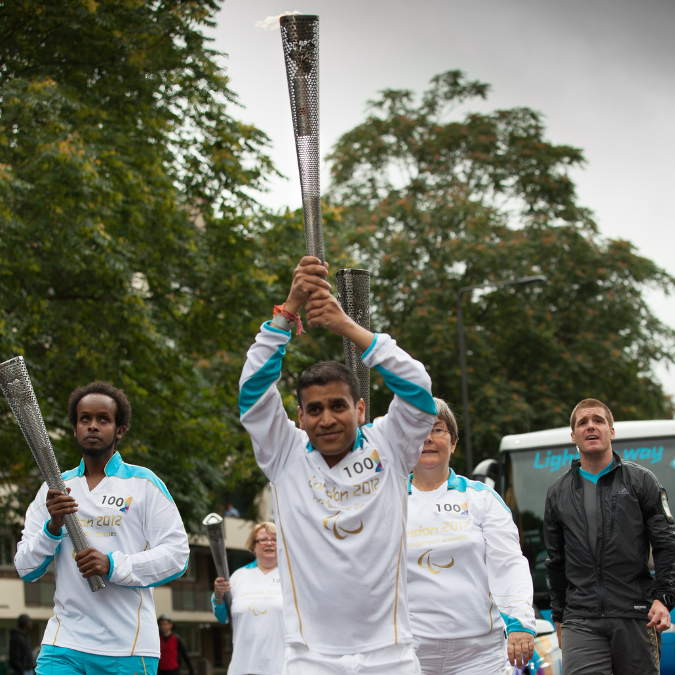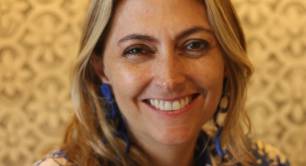‘No person can transform a system by themselves, it has to be from a me to a we’ – Dr Kush Kanodia
MY IMPACT STORY: The award-winning disability rights campaigner and social entrepreneur shares his story of how he transformed pain to purpose – and became one of the most influential disabled people in the UK.
|
Dr Kush Kanodia will be speaking at our SE100 Social Business Coffee Break webinar on 5 December 2023 on ‘how to champion disability in your social enterprise’. Book your free place now. |
Diagnosed with multiple epiphyseal dysplasia, a rare genetic condition, as a child, Kush Kanodia grew up in constant agony. His hips would dislocate regularly, at any point in time, from standing up from a chair to walking to school. Later in life, after getting his hips replaced, he realised how much his incessant pain affected his academic achievements. This awakening is what spurred his passion for tackling injustice.
Today, Kush Kanodia boasts an extensive portfolio of achievements as a serial social entrepreneur and disability rights campaigner. Originally an investment banker at multinational financial services provider Morgan Stanley for several years, in 2009 he co-founded Choice International, a not-for-profit disability sports organisation which aims to promote diversity and social inclusion. In 2012, he also co-founded international tech start-up HeartsMap which aimed to connect local communities and enterprises around the world with common goals. He joined changemakers’ leadership programme On Purpose in 2012. Kush later joined Kaleidoscope Investments, which provides funding and support to disabled entrepreneurs, as chief disability officer in 2019.
Currently, he is vice chair for the Regional Stakeholder Network for Greater London with the Cabinet Office’s Disability Unit, which is an advisory body to the UK government, and is a trustee at technology accessibility charity AbilityNet.
In 2019, he received the Asian Achievers Award for Entrepreneur of the Year and also the Social Entrepreneur of the Year Award from enterprise support organisation TiE London. Ranked second in Shaw Trust’s Disability Power 100 list, he is recognised as one of the most influential disabled people in the UK.

What I’ve dedicated my career to is equity in our society, to make sure that we move barriers from our society in relation to things like accessibility, to make sure that those most disadvantaged in our society also have a fair chance to succeed, to prosper, to thrive… to really live their dreams.
When I was a child, I experienced lots of pain, suffering and discomfort. One of the things that was not fully described to me was the impact of the pain. When I was a child I thought I was an average student, because I got average GCSEs, average A-Levels and an average degree. It was only after I had my hips replaced in 2002 that I actually realised that it was the pain that was hindering my performance, because I couldn’t sit down and work for long periods of time as my hips would dislocate. When you’re in significant pain and agony you can’t concentrate. After I had my hips replaced, I went back and did an MBA, received a distinction and really started to excel academically and professionally. Previously, I never really fully understood how a disability could impact one’s full potential. That [realisation] ended up shaping my career.
|
Bio in brief
|
My disability had given me attributes that transitioned my life from being an investment banker to being a social entrepreneur

The moment where I realised that I wanted to dedicate my life to tackling inequality happened in 2012, when I became a torchbearer for the London 2012 Olympics. Before that, I had kind of labelled my disability as a curse, due to being smaller, weaker, always in pain, and the other negative labels that are generally associated with the disability from society. But what I actually realised is that the disability had given me all these wonderful values: to be humble, to be compassionate, to be kind, to be a problem solver. It had given me attributes that transitioned my life from being an investment banker to being a social entrepreneur, from being focused on money to being focused on creating social value. I realised at that time that I choose the labels I associate with my disability, and I reframed the labels from being a curse to a blessing… from being something that used to hold me down to something that was actually lifting me up, giving me purpose and meaning in my life. When I did that, it completely transformed my relationship with my disability, and the energy and focus that I had in being a changemaker and a social entrepreneur.
Becoming a torchbearer started to open up all these opportunities that hadn’t really previously existed. One of the key things that happened was that I joined a charity called Level Playing Field. Level Playing Field was in a five-year battle with the Premier League in regards to making Premier League football stadiums more proportionally representational to the number of wheelchair users in society. This was actually the first time I really learnt about campaigning and systems change.
My biggest achievement was transforming over 200 NHS hospitals in England, helping 2.5m disabled people with blue badges to access critical health care. This was the most significant disability inclusion policy change to happen during the pandemic and cost-of-living crisis. [In 2021, charges for people with blue badges in their cars, which shows they have a disability, were abolished in 200 hospitals.] As a disabled person, I knew that if I can’t manage my healthcare, if I can’t access hospitals, then I also can’t access education, employment and be a full participant in society. No person can transform a system by themselves; it has to be from a ‘me’ to a ‘we’, but essentially, I was the person who started the campaign, so I’m the one that challenged the NHS [the UK’s national health system]. The truth is, most politicians wouldn’t challenge the NHS. It’s the largest health system in the world. We know how revered the NHS is. I’m a child of the NHS; my dad is a retired GP. I love the NHS. If it wasn’t for the NHS, I wouldn’t walk today. And that’s the reason I challenged the NHS, because I wanted it to be accessible and inclusive for everybody.
My biggest regret is linked to my greatest achievement. When we got the policy [to exempt blue badge holders from NHS parking charges] into the [party] manifestos, it was supposed to be implemented into law in January 2020, just when the pandemic was starting. The government delayed the implementation until April 2021. Disabled people were the most disproportionately impacted from the pandemic. So 60% of all Covid-19-related deaths are disabled people, even though disabled people amount to 17% of the population, according to the Office of National Statistics. I really believe that the delay would have resulted in more disabled people potentially dying from Covid, because there was more risk from taking public transport rather than driving. There was a cost of living crisis, so people couldn’t necessarily afford to pay these charges, especially disabled people when they’re choosing between eating and heating. That delay was a real regret and a really painful moment.
The biggest shock of my career was the level of collusion between the media and the government. A lot of people don't fully know that I’m probably the most successful disability rights campaigner of my generation. I've transformed three significant systems from the Premier League to NHS England to Greater London. The success has sometimes been hijacked by the government, and that was just for the NHS. The media never actually published the success of the campaign or gave me credit for that, and that was a real shock for me. I thought there was some aspect of independence and honesty within the media. It’s so rare to transform a system like the NHS as a disabled person. If they actually were honest, it would have actually been a really amazing story about how a disabled person transformed the largest health system in the world. It would have helped to empower the next generation of disabled leaders, campaigners and changemakers.
Entrepreneurship for me is going beyond a primary focus of just making more and more money. Social entrepreneurship for me, is a dual focus on transforming and leading systems for social change and impact, as well as self-generating income and revenue. I believe charities can become too reliant on donors and grants, and social entrepreneurship is a more sustainable way of creating social impact in times of dynamic change and a cost of living crisis.
I am a fellow of a great social enterprise called On Purpose, where I was an associate in 2012. On Purpose runs leadership programmes that help people change the world through the work they do and the lives they lead. Founded by Tom Rippin in 2009 in London and has since grown to both Paris and Berlin. We need more changemakers in the world and On Purpose is helping to deliver that change.
- Listen to our Good Leaders podcast with Tom Rippin: 'Good leadership is the ability to envisage a very different future'
I am truly inspired by Mr Alan Turing, often dubbed ‘the father of modern computing and artificial intelligence’. Like most disabled people, during his life he was not really recognised for his achievements, but he shaped the history and future of Europe and the world, as well as computing and AI. My favourite quote often attributed to Alan Turing is: “Sometimes it is the people no one can imagine anything of, who do the things no one can imagine.”
Rather than a book, I want to recommend an experience, a self inquiry. I find as a society, we are too in our heads and need to get more into the body. I do these ten-day silent meditation retreats called Vipassana’. The true learning for me has come from silence and stillness, awareness and equanimity.
What I’m currently focusing on is eco-ableism. Now what I’m campaigning to do is change the law in England and exempt all blue badge holders from [paying congestion charges] in all clean air zones in England. Climate action must go hand in hand with climate justice and social justice. Otherwise, all we’ll do is disproportionately impact those who have already been the most significantly impacted during the pandemic and the cost-of-living crisis. This could be used as a blueprint and a benchmark globally because other cities and other countries will also be implementing clean air zones.
Top photo: Dr Kush Kanodia receiving his honorary doctorate from University of Kent. All photos courtesy of Kush Kanodia
Thanks for reading Pioneers Post. As an entrepreneur or investor yourself, you'll know that producing quality work doesn't come free. We rely on our subscribers to sustain our journalism – so if you think it's worth having an independent, specialist media platform that covers social enterprise stories, please consider subscribing. You'll also be buying social: Pioneers Post is a social enterprise itself, reinvesting all our profits into helping you do good business, better.


